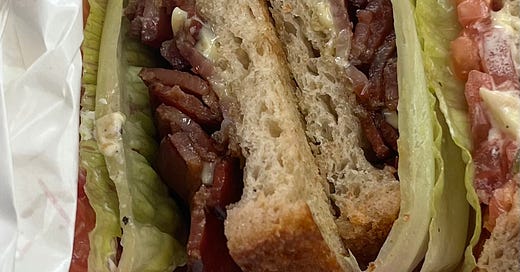I received three text invitations asking me to join Beli last week and have declined (or ignored) them all. The messages were the same: shared links from friends hoping to unlock new features on the app. I don’t fault the senders for assuming I’d be open to joining—the abundance of quality restaurants is a perk of living in New York City, and I take full advantage. I chase the thrill of trying a new, underground spot and positioning dishes and martini glasses to orchestrate a picturesque display of my meal. Yet, the thought of partaking in this online rating system irks me. Do I need to download another form of social media?
The very concept of publicly ranking food this way gives me pause:
Everyone has different preferences and tastes, so you may avoid a restaurant you’d have liked because a friend disliked it
Ranking restaurants of different cuisines against one another makes no sense—they play in different leagues
I doubt anyone would be able to sufficiently explain what made one spot an 8.2 and another an 8.3
While Beli isn’t a social media app in the traditional sense, it advertises users’ ability to “see where your friends are eating.” In addition to the rating given, you can see where and when they’ve visited, as well as any included photos and comments. This was my tipping point.
We have become so used to both tracking everything in our lives and sharing it all with everyone, too. Maybe the alarms should have sounded earlier when Find My Friends was introduced in 2019, when we handed over our privacy casually to our parents, sorority sisters, and Apple. My co-worker lied about her whereabouts last year on Halloween after being tracked by her mom across the world, claiming she was sleeping at my apartment after appearing on Rivington Street at 4 a.m. instead of her place on the Upper East Side. Her one-night stand did not go unnoticed. Meanwhile, there are similar discoveries to be made on Venmo. I found out my high school crush lives with his girlfriend, observing the series of monthly transactions titled “rent and utilities” between them. These unexpected sources of gossip may be amusing but we are inching closer to a life of no privacy at all—and that is no laughing matter.
That’s the cost of having an online presence. Influencers who became famous for their relationships suddenly feel obligated to explain why a breakup occurred or defend their behavior when the other party shares their side. A man I met at Jac’s on Bond bragged about knowing a guy who visited the most restaurants in a year and ranked them all on Beli. I was unimpressed. “Wow, he must be really rich and not have a job,” I retorted. He laughed. “Exactly.” A restaurant listing app may seem harmless, but it’s another gateway to digital nudity, and I already feel overexposed. Food is extremely personal and I view meals as a sacred time in my day. Even if you don’t mind people seeing what you eat, you are unwittingly performing for an audience, wanting to show them you have a social life and somehow snagged an impossible reservation.
Every Monday, my office mates and I congregate in the aisle of my cubicle to recap our weekends. We almost always begin with a restaurant review. Beli eliminates this need for an in-person conversation, giving us another opportunity to replace speaking with scrolling. The app also reduces recommendations to an algorithm. Between your friends’ reviews and Beli’s suggested spots, why would you ever stray and be spontaneous? Relinquishing our own autonomy has never been so easy. I hope we aren’t too far gone, and are still capable of deciding where to eat without consulting our phones.
In short, stop sending me your Beli referral links. Talk to me instead. I had the best BLT last weekend, and I’d love to tell you about it.
With love,
Emma





Okay spill, where is the BLT from